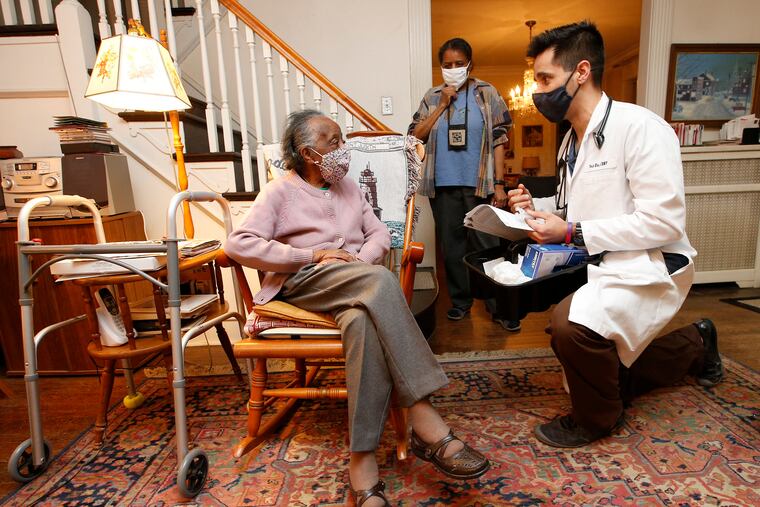‘House call heroes’ can get more people vaccinated in Philly and beyond | Opinion
Too many of our region’s residents are unvaccinated, but we have tools to help.

When I arrived for work at the health center on a chilly recent Monday morning, I didn’t know I’d end my day on Sheila Holloway’s cozy sofa watching Meghan, Oprah, and Harry.
For Ms. Sheila, a mother and family caregiver, getting to our health center with one child was a challenge. A debilitating chronic condition made that commute difficult. For Ms. Sheila and her two adult children with developmental disabilities, a family vaccination trip was nearly impossible.
To Pennsylvania health-care providers like me, the increased availability of COVID-19 vaccinations has meant more opportunities to make house calls to patients like Ms. Sheila and her children. The 15-minute postvaccination observation window allowed me to learn more about this loving family, share a few laughs in their living room — and even briefly catch up on the former royals.
» READ MORE: Black and Latino communities have a vaccine distribution crisis | Opinion
Efforts at the nurse-led Family Practice and Counseling Network (FPCN) to vaccinate high-risk patients like Ms. Sheila and her family in their home are important — but the exception. Too many of our region’s most vulnerable residents remain unvaccinated.
Some remain skeptical of the vaccine. The loathsome effects of systemic racism in health care are reflected in shameful disparities in local vaccine access for communities of color. But Ms. Sheila and her family consented to get vaccinated, after four separate discussions to discuss concerns and misconceptions about the vaccine.
Vaccine hesitancy is just one hurdle, alongside: Determining who is eligible. Lack of internet access. Finding potential vaccination sites. Mixed messages and fickle websites. Scouting available appointments that are as rare a sight in Philadelphia as a Ben Simmons three-pointer.
Then if they can get an appointment, patients must secure transportation and be willing and able to wait in crowded lines.
For centenarian and retired children’s librarian Jessie Birtha, access to the vaccine occurred by serendipity. Ms. Jessie and her caregiver daughter, children’s author Becky Birtha, waited for months in vain to find their doses. Going to a vaccination center in Center City was not a possibility.
“The Liacouras and Convention Centers were out of the question,” Ms. Becky told me. “There was snow on the ground. To get downtown. It just wasn’t safe for [mom] to go out.”
Experts say we need a better plan to get homebound residents — most often older adults and persons with disabilities — access to the vaccine. The house call approach our health center used to reach both families that night might be the answer.
Just as our elected officials bring their messages door to door come election time, we need trained volunteers and staff to go directly to communities to get our most vulnerable residents vaccinated at home.
» READ MORE: Philly’s FEMA mass COVID-19 vaccination site draws thousands to its official opening
To get Ms. Becky and Ms. Jessie vaccines, the Philadelphia COVID-19 Health Equity Coalition and FPCN collaborated to transport two leftover “angel doses” that became available for home delivery.
On a broader scale, this approach would involve multiple avenues for vulnerable homebound residents to sign up for home vaccination. Then, a health-care provider or paramedic would bring doses at scheduled times and monitor patients for 15-30 minutes postvaccination.
Supplies would be minimal: a laptop to record the shot, a few Band-Aids, alcohol swabs, and cotton balls, and an EpiPen on standby — a standard precaution for the unlikely event of a severe allergic reaction.
A home vaccination program like this could be a joint effort run by local health-care organizations and government agencies. Groups could work together to vaccinate these high-risk individuals using existing vaccine supplies and “angel doses.”
These “house call heroes” would be like the Avengers in scrubs. Frontline guardians swooping in to protect families from a deadly virus, one home at a time.
Programs to bring vaccination doses to residents’ homes are far from novel and are consistent with recent recommendations by commissioners on the Philadelphia Mayor’s Commission on People with Disabilities. Places like Boston, Los Angeles, Fort Worth, Texas, and St. Joseph, Minn., have already rolled out mobile vaccination programs for residents. And our Philadelphia Fire Department, in coordination with other city agencies, soon plans to deploy EMS providers to inoculate homebound residents.
» READ MORE: Why are Black people being treated like America’s vaccine hesitancy problem? | Opinion
FPCN has already made over three-dozen home visits to vaccinate vulnerable homebound patients, most with our clinic’s “angel” doses.
Now with the availability of the single-dose Johnson & Johnson vaccine, which is also easier to prepare and store, a mass home vaccination program has never been more possible.
Efforts to get families like the Holloways and the Birthas vaccinated demand extra coordination and resources — but are worth it.
“If you didn’t come here tonight,” Ms. Sheila said as I crossed her doorway that moonlit evening, “I don’t know how we would have gotten these shots.”
Tarik S. Khan is a family nurse practitioner at FPCN’s Abbotsford Falls Health Center in Northwest Philadelphia, a Philadelphia native, president of the Pennsylvania State Nurses Association, and a predoctoral fellow at the NewCourtland Center for Transitions in Health at the University of Pennsylvania.